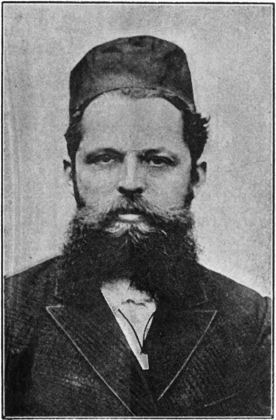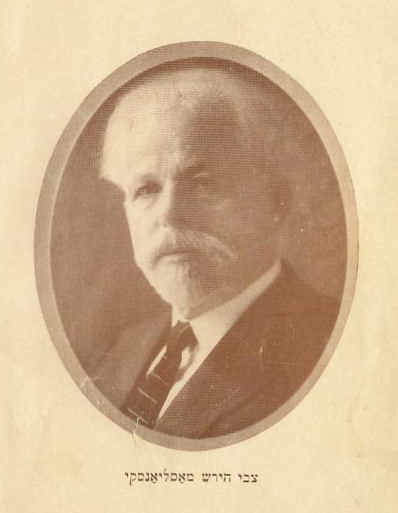 |
|
Zvi Hirsch Masliansky
(age about 39) Sent by Harry Boonin (www.Boonin.com)
who found this image in a book published in 1895 in
Manchester, England. Masliansky would leave for New York
City in the summer of 1895. About nine years later he would
be lecturing at the Educational Alliance where he would
inspire many young men, including "Abe" Silver.
What is a magid?
|
 |
|
Zvi Hirsch Masliansky
(probably in his late 60s)
From his
autobiography Masliansky's Memories - Forty Years of Life
and Struggle, written in
Yiddish and published in 1924.
|
BIOGRAPHIES
Jewish Encyclopedia
|
MASLIANSKY, ZVI HIRSCH (1856–1943),
popular Yiddish orator, the most eloquent and influential Maggid on
the American scene at his time. Masliansky was born in Slutsk,
Belorussia. He taught at the Polish talmudei torah and at the
yeshivah of Pinsk (1882–90), where one of his students was Chaim
Weizmann. Stirred by the pogroms of 1881, he became a proponent of
the idea of a return to Zion. He was active in Hibbat Zion, and
fellow-Zionists M. M. Ussishkin, M. L. Lilienblum, Ahad Ha-Am, and
L. Pinsker encouraged him in his activity as a wandering preacher of
Zionism. His fame as an impassioned orator spread rapidly throughout
Russia.
Compelled to leave the country in 1894, he undertook a
lecture tour of Central and Western Europe and in 1895 emigrated to
New York. During the three decades that followed, he helped
popularize Zionism, wielding a great influence upon Yiddish-speaking
immigrants, especially through his Friday evening sermons at the
Educational Alliance on East Broadway. He combined the qualities of
a maggid and those of a modern speaker. He was able to hold the
attention of a popular audience and scholars as well. His imposing
figure further strengthened the impression he made. He was also
active in U.S. Zionist organizations.
Masliansky founded and coedited the
daily Die Yidishe Velt (1902–05). His Yiddish sermons were published
as Maslianskys Droshes fir Shabosim un Yomim Toyvim (2 vols.,
1908; Eng. tr. Sermons by Reverend Zevi Hirsh Masliansky, 1926). He
also published a memoir, Fertsik Yor Lebn un Kemfn ("Forty
Years of Life and Struggle," 1924), and a collection of Hebrew
articles, Kitvei Masliansky (1929).
[Sol Liptzin] |
Source: Sermons by
Reverend Zevi Hirsch Masliansky,
Published in 1926 by the Hebrew
Publishing Company and found on the web at
www.hebrewbooks.org/pdf/masliansky.pdf
|
Biography of Rabbi
Masliansky (see note)
By Joseph Masliansky, Brooklyn, N.Y.
Stories as told to me by my father Aaron, who recalled every sermon.
Zvi Hirsh's father, Chaim and my grandfather Avraham Yitzchak's
father, Yehuda Leib, were brothers.
For the most part, they lived in Slutzk, White Russia. The families
were as one, and considered themselves more like brothers than
cousins. Zvi Hirsh started to speak at a very late age and everyone
thought that something was wrong with his vocal cords. Surprisingly, at the age of
7, to the bewilderment of his parents,
on Shabbat Chazon, the Sabbath before Tisha B'Av, he picked up the
table cloth from the Sabbath table, put
it on as a Talis and spoke of the destruction of the Temple before
his friends. His father, sensing the deep
and innermost feelings of his son, scolded him for having taken the
table cloth as it was not dignified to
leave the table uncovered on the Sabbath.
His memory was fantastic.
He knew the entire Tanach by heart at
an early age. He was an ardent Zionist and traveled around Russia
and Poland preaching for the cause and
giving hope to the destitute, homeless and the poor. On one
Saturday, he spoke in a synagogue about
AVNER. Avner was a general of King David. But the audience knew the
Avner that Masliansky was
talking about. Not General Aviner but Avner stood for the initials
of the Czar's name. Alexander Ben
Nicholai Romanov. The first letters spelled AVNER. A Jewish informer
who was in the congregation
notified the Russian police and they-gave him one month to
leave-Russia.
In New York, when he arrived,
the Yiddish newspapers announced that Masliansky Yidaber, Masliansky
will speak on that Sabbath at the Beth Hamedrash Hagadol on Norfolk Street, the East Side. Thousands
came to greet him and the New York
police had to make a path for him to enter the synagogue. He
remarked, look how wonderful the new world
is. In Russia he had to run away from the police and in New York,
the police made a path for him. This
happened in 1896.
In 1910, at a case involving the stopping of new
and especially Jewish immigrants from
Poland and Russia, brought on by the Commissioner of Immigration who
was known as "Czar Wilson",
Masliansky was called upon to testify for the unwanted refugees
traveling in steerage. He made the
following statement when confronted that what this country needed
was muscles, brawn and strong backs
to build the railroads and factories. His reply was "strong muscles
and brawn can also make criminals and
burglars who break locks. Strong minds and brains create a world of
creativity and progress that builds a
country." He created a stir and won the case. The refugees did not
have to return to Europe. His strong
words were and are responsible for all of us to be in the U.S.
today. We too could have perished in the
Holocaust had our grandparents and parents been denied entry to this
country."
Note: Though Masliansky always called
himself 'Reverend' many of his supporters believed he had been
ordained in Russia. Dr. Gary P. Zola's study of Masliansky makes no
mention of Masliansky's ordination.
|
|
|
As an influence on Abba
Hillel Silver
From the Youth page of the Abba
Hillel Silver website:
In his unpublished autobiography
(in the archives at the Western Reserve Historical Society in Cleveland,
Ohio) Silver cites where his oratorical inspiration may have
originated. He wrote:
|
"Among my
unforgettable memories of those years were the lectures of the Rev. Zevi Hirsch Masliansky which I attended regularly
every Friday evening at the Education Alliance. Masliansky
was the most popular preacher-lecturer on the East Side in
those days. Thousands flocked to hear him. ... I sat every
Friday evening in the wings of the stage of the Educational
Alliance — Rev. Masliansky was fond of me and had invited me to sit there —
and I listened to the captivating flow of his eloquence.
After these many years I can still taste the sweet honey of
his words." Quoted in Raphael (7) |
|
|
Respect for Masliansky spans
the Jewish religious spectrum
|
|
Masliansky's role
Dr. Gary P. Zola, in his study of Masliansky, calls him
"Matif Leumi" -
The National Preacher. Soon after arriving in New York in
1895 he altered his appearance, his beard becoming a more
modern goatee, and changed his speaking style. Still
preaching in Yiddish, but no longer speaking only of
Zionism, "Masliansky preached a love of Judaism and a pride
in Jewish peoplehood." He was admired and supported by
established, wealthy, largely German-Jewish "Uptown" Jews
and loved "Downtown" by the newly arrived Yiddish-speaking
Jews from Eastern Europe".
Zola writes (p. 36) of Masliansky's lectures. "Delivery
was spellbinding. His voice was a full tenor and his movements
were startling and dramatic. He thundered
and whispered - captivating his listeners for up to two hours."
We can only imagine
young "Abe" Silver seated near the podium absorbing this and then read
an account (only ten years later) of Silver's own
oratorical style.
By the 20's Masliansky's audiences had declined
significantly and in 1927 he resigned his position at the Educational
Alliance.
Masliansky died January 11, 1943 age
87. His
funeral was attended by many leaders of American Jewry and the
Zionist movement, including Rabbis Stephen S. Wise and Abba Hillel Silver
and Dr. Nahum Goldman.
Added August 2010
Abba Hillel Silver's eulogy of Zvi
Hirsch Masliansky
|
|
To learn more about
Masliansky
The "uptown" supporters of
Masliansky's
work
His advocacy of immigrant self-development,
responsibility, setting aside nationality differences and
adopting American values resonated with New York's Jewish
elite. They supported his work at the Educational Alliance
and backed his newspaper Die Yiddishe Welt. (More
in a Google book)
|
|
|